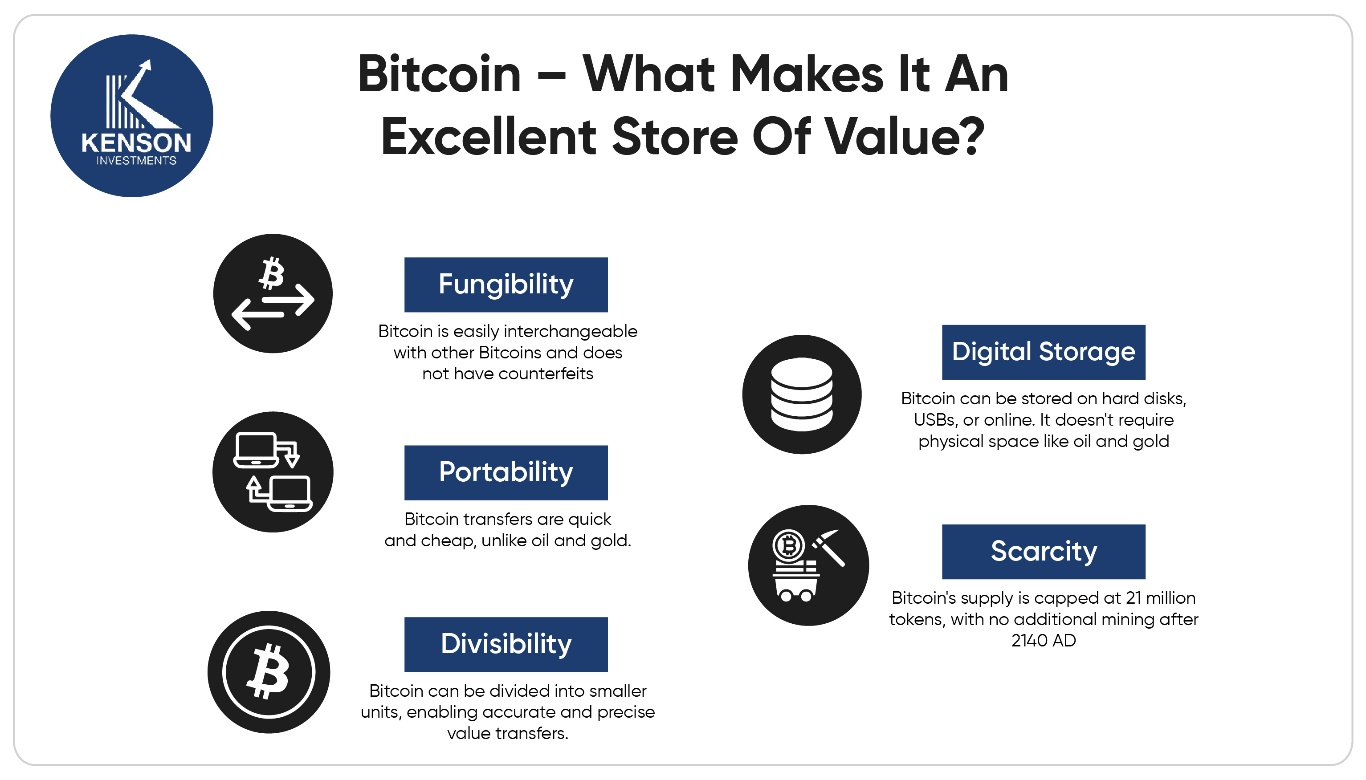Gold has long been regarded as a safe haven asset, prized for its scarcity, durability, and intrinsic value. Similarly, Bitcoin, created in 2009 by Satoshi Nakamoto, is a decentralized digital currency that shares some of these attributes but exists solely in digital form.
Unlike traditional fiat currencies controlled by central banks, Bitcoin operates on a peer-to-peer network secured by cryptography. This distributed ledger technology, known as blockchain, ensures transparency, immutability, and security in every Bitcoin transaction.
Key Characteristics of Bitcoin
Scarcity
Bitcoin’s supply is capped at 21 million coins. This finite supply is embedded in its protocol, ensuring that no more than 21 million Bitcoins will ever exist. This scarcity is reminiscent of gold, which is limited by natural reserves.
Additionally, new Bitcoins are introduced to the market through a process called mining, with the rate of issuance halving approximately every four years (the “halving” event). This predictable supply schedule contrasts with fiat currencies, which can be printed in unlimited quantities by central banks.
Divisibility
One Bitcoin can be divided into 100 million smaller units known as satoshis. This high level of divisibility allows for micro-transactions, making Bitcoin practical for everyday use regardless of its overall price. The ability to divide Bitcoin into tiny fractions ensures it remains accessible to a wide range of users, even as its value increases.
Durability
Bitcoin exists entirely in digital form on the blockchain, a decentralized ledger that records all transactions. This digital nature ensures that Bitcoin cannot be physically damaged, lost, or destroyed like physical assets.
The blockchain’s immutability guarantees that once a transaction is recorded, it cannot be altered or tampered with. This durability provides a high level of security and trust in the system.
Portability
Bitcoin can be transferred quickly and easily across the globe via the internet. This portability is a significant advantage over physical gold, which is heavy, bulky, and costly to transport.
Bitcoin transactions can be conducted without the need for intermediaries such as banks, making it accessible to anyone with an internet connection, regardless of their location.

Recognizability
Bitcoin is increasingly recognized and accepted by a growing number of merchants, financial institutions, and individuals worldwide. This growing acceptance enhances its legitimacy and utility as a form of currency and store of value.
Decentralization
Bitcoin operates on a decentralized network of computers (nodes) that collectively maintain the blockchain. This decentralization means no single entity or government controls Bitcoin, reducing the risk of manipulation or censorship.
The decentralized nature of Bitcoin also makes it highly secure and resistant to attacks. To compromise the Bitcoin network, an attacker would need to control a majority of the computing power, which is practically impossible given its current scale.
Transparency
All Bitcoin transactions are recorded on a public ledger, the blockchain, which is accessible to anyone. This transparency allows for easy verification of transactions and enhances trust in the system.
While transactions are transparent, the identities of the parties involved are not directly tied to the transactions. Bitcoin addresses are pseudonymous, providing a degree of privacy while maintaining transparency.
Recommended Read: Bitcoin: Evolution, Investment Strategies, and Market Outlook
Bitcoin as a Hedging Instrument
Hedging strategies involve using financial instruments to mitigate risks associated with other holdings. Bitcoin’s unique characteristics make it a potential tool for various hedging strategies:
- Hedge Against Inflation: Bitcoin’s capped supply can act as a hedge against inflation that devalues traditional assets. Investors can allocate a portion of their portfolio to Bitcoin to mitigate the inflationary risk of fiat currencies.
- Hedge Against Stock Market Volatility: Bitcoin’s price movements may not always correlate with traditional stock markets. Including Bitcoin in a portfolio can potentially reduce overall portfolio volatility, offering a hedge during stock market downturns.
- Hedge Against Currency Devaluation: In countries experiencing currency devaluation, Bitcoin can offer a hedge. Investors can convert their local currency into Bitcoin to preserve purchasing power.

Effective Hedging Strategies with Bitcoin
Diversification
Diversification involves spreading investments across various asset classes to reduce risk. Including Bitcoin in a diversified investment portfolio can offer several benefits:
- Reduced Correlation: Bitcoin often exhibits a low or negative correlation with traditional assets like stocks and bonds. This means that Bitcoin’s price movements are not strongly tied to those of other asset classes, providing a hedge against market downturns.
- Enhanced Returns: Historically, Bitcoin has delivered substantial returns, which can enhance the overall performance of a diversified portfolio. By allocating a small percentage of the portfolio to Bitcoin, investors can benefit from its growth potential while managing risk.
Risk Management Techniques
Implementing risk management techniques can help investors manage the inherent volatility of Bitcoin:
- Position Sizing: Limiting the size of Bitcoin positions relative to your overall portfolio can help manage risk. Smaller allocations to Bitcoin can still offer diversification benefits without exposing the portfolio to excessive volatility.
- Stop-Loss Orders: Setting stop-loss orders can automatically sell Bitcoin if its price drops below a predetermined level. This helps limit potential losses in case of significant price declines.
- Options Trading: For experienced investors, options contracts on Bitcoin futures can be used for more sophisticated hedging strategies. Options allow investors to profit from both rising and falling Bitcoin prices, depending on the chosen option type (call or put).
- Correlation Trading: By analyzing the historical correlation between Bitcoin and other asset classes, investors can employ correlation trading strategies. For instance, if Bitcoin’s price tends to move inversely to the stock market, buying Bitcoin during a stock market downturn can potentially offset losses in stocks
- Take-Profit Orders: Conversely, take-profit orders can lock in gains by selling Bitcoin when its price reaches a specific target, ensuring that profits are realized.
- Dollar-Cost Averaging (DCA):Dollar-cost averaging involves investing a fixed amount of money into Bitcoin at regular intervals, regardless of its price. This strategy reduces the impact of market volatility and helps average out the purchase price over time.
Explore More: Dollar-Cost Averaging (DCA) for Crypto: A Strategy for Long-Term Investors
Hedging Against Currency Depreciation
Bitcoin can serve as a hedge against currency depreciation, especially in countries with unstable fiat currencies. By converting local currency into Bitcoin, investors can protect their purchasing power from rapid devaluation. Bitcoin’s global nature allows investors to bypass currency controls and access international markets, providing additional financial security.
Safe Haven Asset
During times of geopolitical tension or financial market instability, investors often seek safe haven assets. Gold has traditionally played this role, but Bitcoin is increasingly being viewed as a digital alternative. Its decentralized nature and limited supply make it an attractive option for hedging against systemic risks.
Ready to explore the world of Bitcoin? Start your learning journey with Kenson Investments. Our team of experienced digital asset specialists offers educational resources to help you understand Bitcoin and its potential role in your investment strategy through blockchain and digital asset consulting. Our bitcoin investment consultants provide insights into Bitcoin’s market dynamics, while our digital asset management consultant services help you manage your portfolio effectively. Additionally, we offer altcoin investment options to diversify your holdings in the digital asset space.
Call 1.800.970.2506 to stay ahead of the curve with analysis and market updates on Bitcoin and other digital assets. Subscribe now!














